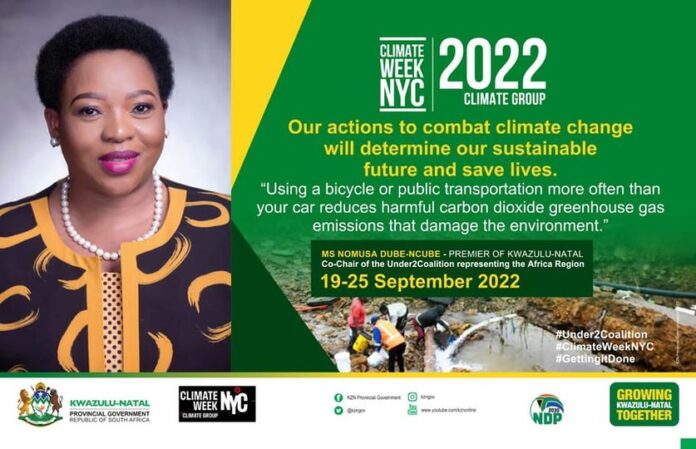
South Africa: KwaZulu-Natal Premier Nomusa Dube-Ncube and Co-Chair of the Under2 Coalition representing the Africa Region made a clarion call for global leaders and big business to bring justice to climate action by ensuring that mitigation actions do not disproportionally affect poor and vulnerable communities and countries.
Premier Dube- Ncube was speaking at the Under2 Coalition General Assembly, being held during the Climate Week NYC taking place from 19-25 September.
The Premier highlighted the impact of climate change on disadvantaged groups across Africa and the skewed vulnerabilities that arise from exposure to natural disasters, susceptibility to damage, and community ability to recover.
“African countries, including South Africa and the poor in the main, have been on the receiving end of climate change, and we are saying to the world that it is about time we seek justice. The unethical development behaviours by big businesses are at the centre. Such as in cases where business mine and do not rehabilitate the land when they have concluded their exploring expedition. If the mine itself has not been rehabilitated, then the chemicals within the mine will continue to affect the surrounding land. This is owing to the fact that the lack of mining rehabilitation makes surrounding land parcels even more vulnerable to climate change when natural disasters strike due to the erosion of exposed soil. If mined landscapes are not rehabilitated, they can negatively affect the surrounding air, water, and local agriculture severely,” said the Premier.
Premier Dube-Ncube said that Just Transitioning in reference to equitably distributing the costs and benefits of climate action, needs to involve poor people in rural areas who are most affected and still need to understand the scientific aspects of climate change.
“Therefore, we need to balance our response through collaboration, cooperation, technology sharing, expertise and good practice from our communities. We are emphasizing that we need support for sharing technologies and believe that there has to be goodwill from political leaders and technical leaders because we have seen pledges being made by various leaders and heads of state, and we have not seen those commitments being realized. Therefore, if we are talking about Just Transitioning and justice for poor people who are at the receiving end of climate change, there has to be political will.
There also needs to be understanding that we need financial support and measures that will help us adapt and adjust so as to mitigate the impact of climate change,” said Premier Dube-Ncube.
Presenting some of the successes recorded by the Africa Region to the General Assembly, Premier Dube-Ncube said members of the Africa Region met on 13 August and have developed climate change strategies that are based on environmental risk assessments and stakeholder consultations across the region.
“We were able to share case studies and best practices as well as develop an understanding of our carbon footprints and the greenhouse gas GHG inventories through the carbon footprint programme that we are working on. However, the unavailability of resources is a huge impediment to the successes that we should be experiencing as the Africa Region.
Premier Dube-Ncube also raised the fact that the limited capacity of governments to respond to the climate change challenge due to financial constraints and technological constraints have been some of the areas that the Africa Region has been looking at.
“The impact of Covid-19 due to limited access to vaccines and the devastation of Covid-19 saw many programmes being shelved due to financial constraints. We have also lost more than 450 lives in KwaZulu-Natal due to the April and May flood disasters, so the limited funding streams and limited access to international finances is a serious challenge for the Africa Region. I cannot say more about the commitments that are usually made in forums, but you never really see the actual flowing down of commitments and pledges to those regions in dire need,” said Premier Dube-Ncube.
The Premier called for closer collaboration, knowledge exchange and sharing of best practice by members of the Climate Group in order to effectively tackle the effects of climate change.